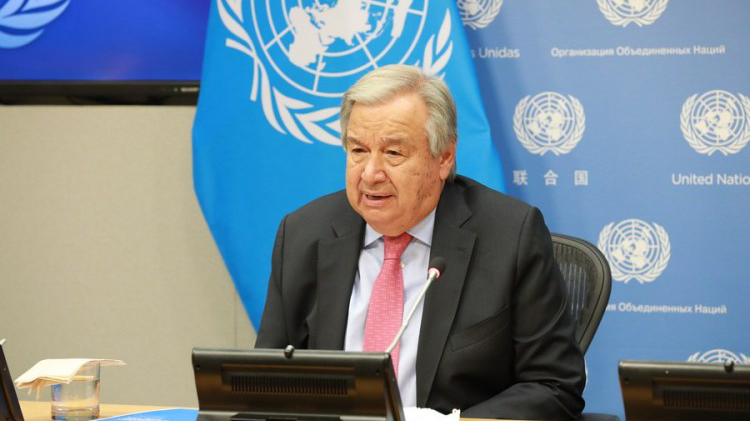
UN Secretary-General Antonio Guterres speaks during a press conference at the UN headquarters in New York, August 3, 2022. [Photo/Xinhua]
By Ruqiya Anwar
The United States intelligence community has long used eavesdropping to spread its tentacles inside the United Nations (UN), much like a greedy and wicked octopus. This goes to show that there are no limits to Washington's snooping obsession. According to media reports, the United Nations has filed an official complaint against the United States for allegedly spying on Antonio Guterres, the secretary-general, and other UN officials. The secretary-general is the latest prominent international official or U.S. ally to be revealed as a target of U.S. espionage.
Recent reports indicate that the U.S. government has spied on the communications of the UN secretary-general and other officials. The reports concerning Guterres and the United Nations surfaced as part of a collection of highly classified U.S. papers that were revealed and disseminated for weeks on social media sites. They contained sensitive information regarding Ukraine crisis as well as data about U.S. allies.
According to the details of some of the previously disclosed classified documents, the United States had the impression that Guterres was attempting to address Russian concerns. Following the onset of Ukraine crisis, U.S. officials privately expressed apprehension that Guterres would oppose certain anti-Russian measures taken by the U.S. and its allies.
Washington has previously conducted a covert espionage operation against senior UN officials including Ban Ki-moon and the ambassadors to the permanent members of the UN Security Council from China, Russia, France and the UK. The operation aimed at the United Nations involved all of Washington's major intelligence agencies.
Washington has increased its surveillance on others over the years, allegedly out of concern for its national security. As long as it serves the interests of the U.S. military and intelligence community, espionage is acceptable for the U.S. government. The worldwide community has long ago come to see U.S. intelligence organizations as an epidemic. They use intelligence to retaliate against alleged competitors and opponents, which serves the U.S. hegemony. In addition, they exploit the data to politically blackmail other nations. Without any moral constraints, they behave like a dictatorship.

The U.S. Capitol building in Washington, D.C., the United States, December 8, 2022. [Photo/Xinhua]
Spying is unnecessary if a nation desires shared, comprehensive, cooperative, and lasting security, and only a terrible nation like the U.S. would steal intelligence. At the same time, the rest of the world shouldn't let the U.S. keep spying on everyone without any checks. Instead, it needs to speak with one voice to stop Washington from being dominant.
However, the hegemony of the United States is at the heart of this issue. And the only time world will be free of U.S. surveillance is when the country's hegemonic system collapses completely. Washington is so accustomed to hegemony that altering its mindset and behavior is almost impossible. To eliminate Washington's eavesdropping octopus, more has to be done to challenge U.S. dominance. The response from allied nations was swift and harsh the last time a trove of stolen data revealed U.S. surveillance activities throughout the globe.
Recently released confidential papers from the U.S. Department of Defense show once again that how the U.S. spies on and breaches the sovereignty of even its closest friends. Allies are so reliant on the U.S. for security that they cannot do much about U.S. surveillance and espionage, a stark illustration of their unequal relationship with the U.S. Wiretapping will continue as long as their security relies on the U.S. The U.S.'s hegemonic approach to international affairs is increasingly criticized by other nations. While other coalition partners remain silent, their dissatisfaction with the U.S. is growing.
The United States asserts that it supports the United Nations but has been accused of spying on the organization; the United States also claims that it defends freedom and democracy yet employs cutting-edge technology to create the matrix. The U.S.'s actions are not consistent with the obligations outlined in the UN Charter and the Convention on Privileges and Immunities of the United Nations. Therefore the U.S. owes a clarification to the international community, particularly the United Nations, and should take concrete steps to fulfill its duties and responsibilities.
Ruqiya Anwar, a PhD scholar of Media and Communication Studies from Pakistan, is a researcher and socio-political analyst.

 中文
中文



